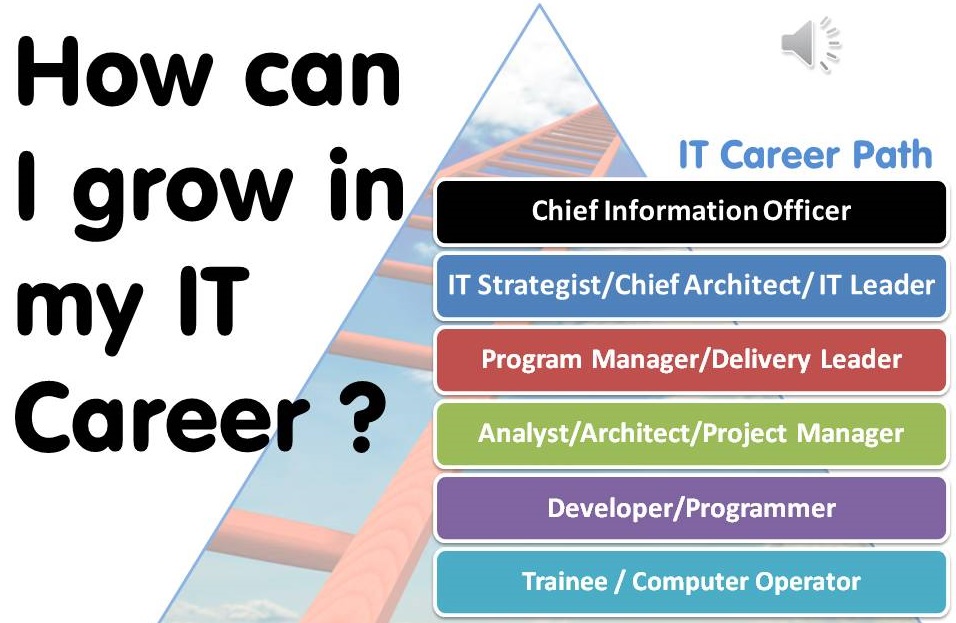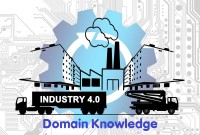- Home
- Business Processes
- Industry Knowledge
- Aerospace Industry
- Automotive Industry
- Banking Domain
- BFSI Industry
- Consumer/ FMCG Industry
- Chemicals Industry
- Engineering & Construction
- Energy Industry
- Education Domain
- Finance Domain
- Hospitality Domain
- Healthcare Industry
- Insurance Domain
- Retail Industry
- Travel and Tourism Domain
- Telecom Industry
- Leadership Skills
- eLearning
- Home
- Leadership Skills
- Career Management
- What is a Career Path
What is a Career Path
In the early years, most jobs were skill-oriented, and with the development in lifestyles and technology, the current jobs are knowledge-oriented jobs such as management, accountants, design, or computing. Career paths encompass varied forms of career progression and this article discusses how we can build a fulfilling career? Learn here about career paths, industries, and opportunities for gaining experience in the field of your choosing.
What is Career Path?
According to the dictionary a ‘career path’ is the “way that you progress in your work, either in one job or in a series of jobs.” During the course of your career, you generally keep rising on the ‘career ladder’ where you perform a series of jobs from the lower paid job with less responsibility to the highest paid with the most responsibility within a company or particular profession. Career planning is the planning for career progression that is your plan for the process of making progress to better jobs.
Only ~30% of college graduates work in a job related to their major subjects in college. With such a low number, it’s safe to assume most people don’t know what their ideal career looks like. It can take years of doing the wrong job before you find the right fit. Day-to-day work and a company’s culture all play a part in finding the perfect career.
Types of Career Path
Career paths can basically be categorized into two broad types: one is a job-oriented career another is entrepreneur oriented career. Further, a job can be classified into two broad categories namely knowledge-oriented job and skill-oriented job. From an industry standpoint, different career paths can be divided into the following categories:
- Arts & Communication
- Business, Management, Commerce, Marketing and Technology
- Engineering, Manufacturing and Industrial Technology
- Health Sciences & Healthcare Services
- Human services
- Natural Resources and Agri-science.

Career Progression - Example
Students need to find what they are good at, but also that also needs to be something that has some demand. At the end of the day, you need to cater to the needs of the current market. Timing is very important when choosing the right career path. Career paths encompass varied forms of career progression and given below if a typical career path for software professionals. Later in the article, we will look at what professional career progression is and how to climb the career ladder effectively.
1. Early Career
When you get out of your college and decide to pursue a career in Information Technology; you start as a Trainee. Your depth of contribution is focused on your technical expertise or dynamic ability to do a particular job extremely well. You start building your breadth of contribution by building the ability to do all of the jobs in the team, to cross-train, to be flexible and you observe various skills exhibited by your seniors like leadership skills, training skills, executive skills, and motivational skills. Your sphere of influence is limited to your current team or your project.
At this stage you focus your efforts on gaining more and more knowledge about your chosen technology; and you take roles that expect you to do; code development, programming, or exhibit other technical skills; like testing or documenting.
2. Expanding Your Role
In the next stage of IT career, you broaden your technical expertise; and you start gaining depth in many technologies. Here you grow into roles demanding; technical design, technical analysis; or project implementation. At this level, you start getting exposure to project management and IT leadership concepts.
3. Growing as Manager
As a manager, you will probably oversee employees with a range of functions—accounting, policy, business development, communications—and it’s unlikely you will be an expert in all of these areas. As you grow further, professionals start expanding outside their technical domain; and learn functional and business alignment. You start becoming more accountable and; take people management & organization development roles. This is the entry-stage to senior leadership roles; demanding cross-business and cross-domain exposure. You are expected to do business development; change management; and lead many concurrent projects.
4. Senior Leadership Roles
The next levels from here take you to “IT” Leadership roles. You are expected to exhibit thought leadership in technical domains, help to set “IT” direction for a department or your business unit; and do technology selection & application. You start becoming responsible for major projects & change efforts. Your cross-business and cross-functional skills are in more demand at this stage.
5. Executive Roles
The next roles are the “CIO” or “CTO” roles that are responsible for the overall technology strategy of the entire company. You decide and manage outsourcing and vendor partnerships. You represent your organization in technical industry networks. You are expected to strategize and lead large organizational technology-driven changes. Here you are in partnership with business and generally report to the CEO of the company and need to create an IT value proposition.
Career Planning & Career Path Development
The biggest question to answer is how to plan your career so that you can move from one stage to another. How do you travel the path from stage 1 to the final stage? Given below are key skills that you can acquire to continue your career growth.
Read more about tips on moving higher in your career ladder!
“Start today creating a vision for yourself, your life, and your career. Bounce back from adversity and create what you want, rebuild and rebrand. Tell yourself it's possible along the way, have patience, and maintain peace with yourself during the process.”
― Germany Kentany
Technical Skills to Technical Leadership Career Path
It plays a major role in today’s businesses and building great software requires making decisions from the beginning to the end. The first responsibility of a technical leader is to define the technical strategy and decide on the technical direction the company should take. Technical leadership requires technical excellence, the business and technological context, and the ability to balance between speed, quality, and resource constraints.
Technical Leaders are those who excel and distinguish them as the most skilled and demanded professional who always acts with a high degree of professionalism. They are dedicated learners who are always committed to personal and professional development along-with pursuing a path of lifelong learning. They possess strategic thinking skills with the ability to link technology with business processes to provide quality advice for effective business solutions.
A strong leader must understand the technical details of the overall project and constantly guide the team to stay focused on the overall vision that the organization is trying to achieve. A technical leader must also have the skills to build a strong technical team, assign them meaningful work, and also track and understand the details of the work the team is doing.
How to Build Technical Leadership
Technical leadership requires technical skills as well as functional business process knowledge to gain a complete understanding of ever-changing business dynamics. They need to gain business know-how and enable their technical or functional abilities to work more efficiently and effectively while performing their role, which is to increase productivity, drive operational excellence, and ensure quality, providing better solutions to complex business problems and drive cost reduction in their respective areas.
If you are working in a modern End-to-End integrated IT-enabled enterprise, you need to gain a relevant skill-set, explore techno-functional opportunities, and showcase your expertise and experience more confidently. You should be able to anticipate and address the changing needs of clients, employers, customers, and markets well than any other professional that does not have technical expertise. You should gain substantial knowledge of the industry's most widely used enterprise resource planning tools and important related fields like SOX requirements, Six Sigma, Risks Controls and Governance, Audit of Systems, and can demonstrate this ability to integrate into the business decision process.
You should try to seek formal education to the foundation of key terms and all the key processes applicable to your domain, which will help you in a long way to understanding the business terminology and business needs. This when combined with your technical knowledge will help you in providing effective and efficient business solutions that will help you put your career on a fast track.
Related Links
You May Also Like
-
Building Your Domain Knowledge
Domain knowledge from a career management perspective encompasses the understanding of industry dynamics and business processes of the target operational area. Domain expert exhibits clear knowledge in the respective industry and understands the industry concepts in general. It is always recommended to best highlight your exposure of domain in your resume or cover letter. TechnoFunc provides you with the best tutorials to gain domain knowledge in a large number of industries and business areas.
-
Recognizing Stress & its Sources
As an individual, you almost certainly know what stress feels like. Stressors are events or situations to which people must adjust. Stressors may be physical or psychological in nature. The level of severity of stress is determined not merely by exposure but the intensity, duration, and frequency of stressors. The sources of stress are many. They arise from multiple areas both with the individual and from the environment.
-
Stress is an essential part of our life. No one can live without stress. Stress can be beneficial as well as harmful. Stress as a positive influence adds excitement and hope while as a negative influence it can result in destructive feelings, anger, and depression. Although the general orientation to stress is to consider unfavorable outcomes, yet one must have observed that stress experiences may also facilitate the development of effective and varied coping behavior, increased personal resources, and lead to a sense of competence in development. Stress at a moderate level is not only inevitable but may be useful for physical and mental well-being.
-
Discover Your Career Direction
The process of finding career direction begins with specific career exploration and identification of a career that could be passionate about, a career that allows you to make the optimum use of your talents. After identification of the career, you need to acquire skills and tools, and education that can help you get entry into your dream career. Learn the important tips that you cannot afford to miss.
-
Team Development by Building Trust
As your team begins to work together, you need to establish a way each team member can exchange ideas and build mutual trust. Successful groups are built on trust and collaboration. A free exchange of ideas, in an open environment, will allow your team to get to know each other and enable you to check on how they work together. Learn some tips to help build team trust and establish personal bonds.
-
Robert Katz identified three leadership skills called - technical skills, human skills, and conceptual skills as the basic personal skills essential for leadership. Leaders must possess these three skills that assist them in optimizing a leader's performance. Technical skills are related to the field, human skills are related to communicating with people and conceptual skills related to setting the vision.
-
Evidence of the medically damaging symptoms of work stress necessitates applying the treatment of stress management. Stress management is increasingly drawing the attention to the management experts not only as a remedial measure but also as a way to resource management. If the workplace can be made a little more lovable the increase in the achievement of the organization may be much time more. If group stress can be removed by introducing group discussions and recreational facilities a long-lasting team spirit may get developed.
-
Improving Skills & Competencies
Whenever you are looking for a job or having your yearend discussion with your manager, two terms generally referred to be “Skills” and “competencies”. Today success in a career is an outcome of having essential competencies and building required skills. Skills could be a major distinguishing factor for you to move up on the career ladder and jump from one role to another. Leadership skills when combined with relevant domain and functional expertise can transform your entire career growth and help you have a fulfilling career.
-
In our present Hitech scenario, society is changing very fast. What are the skills that are most relevant for leaders in relation to the changing economic environment? Leaders need to develop skills to drive innovation and change in order to play a more central role in their organizations’ activities. How do managers accept the change and meet business expectations by becoming a key figure in driving change and innovation?
-
“Level 5 Leadership”, this term was coined by Jim Collins in his book “Good to Great” and it is all about achieving "Greatness" as a leader. This article will explain what we mean by Level 5 Leadership and what the characteristics of a Level 5 leader are. What it takes to achieve greatness as a leader, and what are the steps and strategies that one can use to move up to this top level of leadership.
Explore Our Free Training Articles or
Sign Up to Start With Our eLearning Courses

About Us
Learning
© 2023 TechnoFunc, All Rights Reserved










